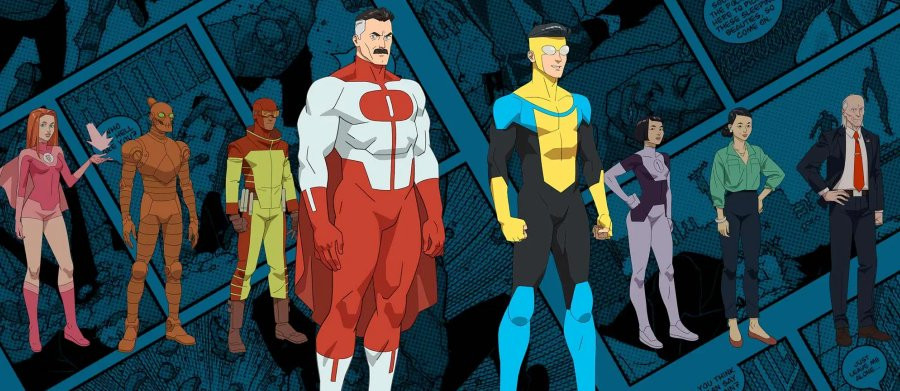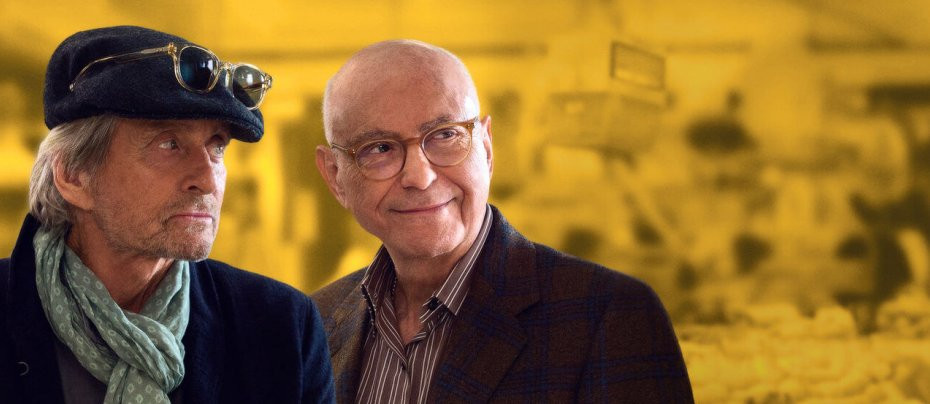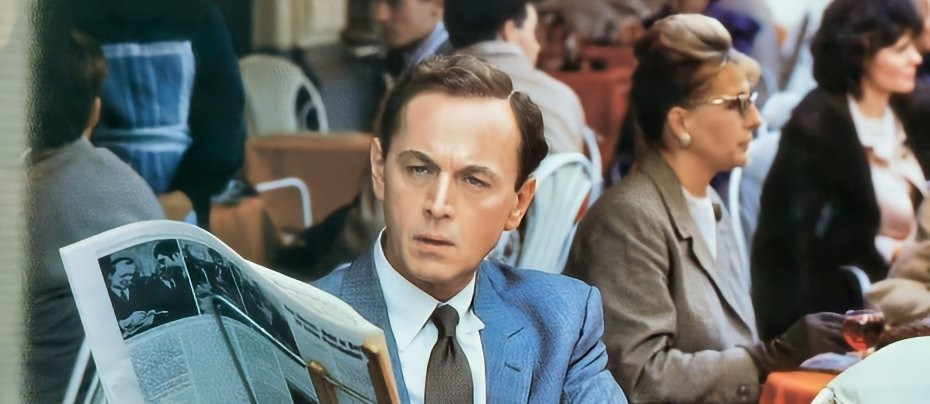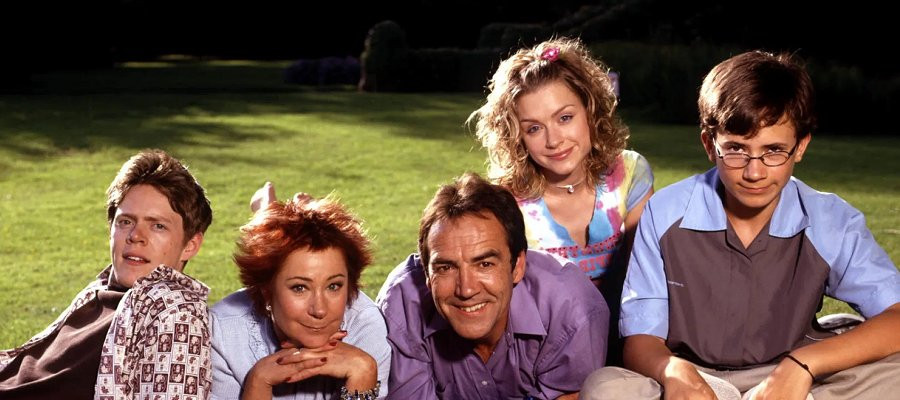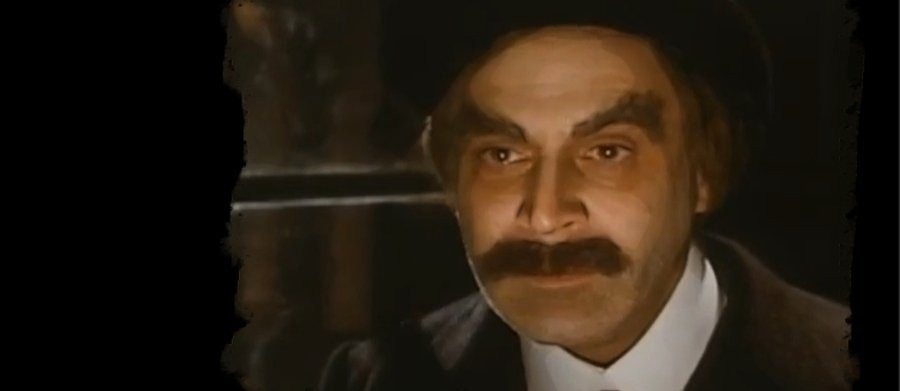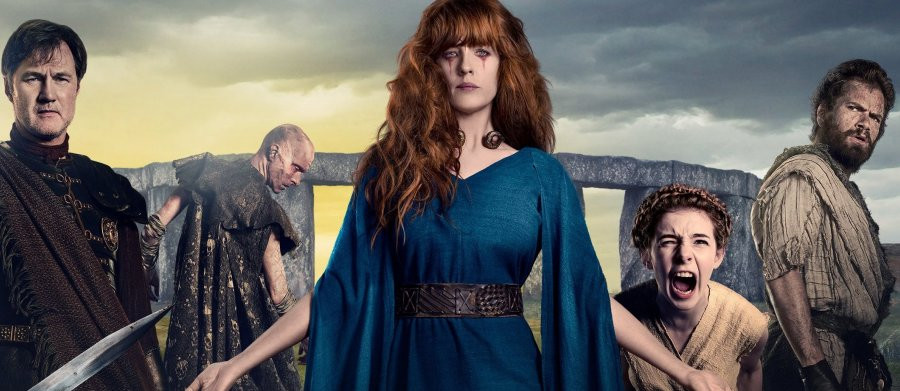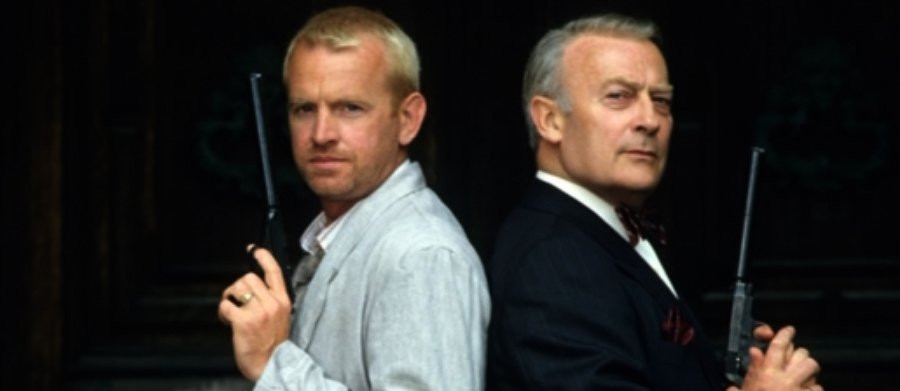
Killing Eve
2018 - United Kingdom'Killing Eve is really "The Villanelle Show" and Comer has by far the most memorable part'
Review by John Winterson Richards
Part of a definite revival in BBC drama in the late 2010s, Killing Eve was an instant hit when it was launched. Phoebe Waller-Bridge was already riding high after both writing and starring in the offbeat comedy Fleabag, and so Killing Eve was further proof of the versatility of her talent. Writers who can succeed at the top level in both comedy and drama are extremely rare.
Moreover, she demonstrated that a distinctly feminist sensibility can be combined with both humour and the excitement of the action genre. This was welcome news in 2018 when the "Me Too" movement had revived feminism and "strong women" were again very much in fashion. All three of the principal characters in Killing Eve are female and, in their different ways, very powerful. It was sold as a story made by women about women which even men might enjoy.
The television version is in fact an adaptation of a series of very short "novellas" written by a man, Luke Jennings. He has since written a couple of full novels to continue the series. However, the plot of the adaptation apparently differs markedly from its source material, and much of the characterisation and dark humour has Waller-Bridge's unique style. The novels seem to be a more serious attempt at a female James Bond, based very loosely on a psychopathic Basque terrorist who murdered 23 people.

This leads immediately to one of the great weaknesses of the project. Dark humour is famously difficult to get right. At some point the darkness usually overwhelms the humour or the humour undermines the darkness or both. It is sometimes a guilty pleasure to see disagreeable people - or nondescript people whom we choose to assume must be disagreeable - perish in amusing ways. Reality clicks in when innocent people or animals are killed. Then the viewer rather reacts against having sympathised with a character capable of such things.
Waller-Bridge just about got the balance right in the first season, but the reaction becomes more pronounced as the victims pile up. The characters become harder to forgive and what once seemed quirkily charming becomes rather obnoxious.
The other great weakness is that characters who seem quite impressive, at least in their respective vocations, become less so as one learns more about them, especially if, instead of evolving and developing with experience, they seem to become progressively more stupid. This may in part be due to a different "showrunner" - executive producer and head writer - being employed for each of the show's four seasons, resulting is an almost inevitable inconsistency of characterisation and tone.
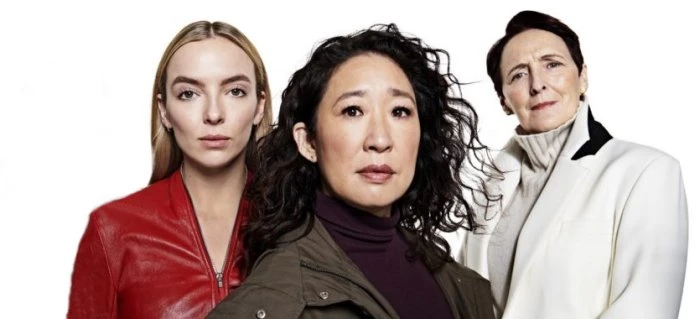
The way that the three impressive women became less impressive was especially damaging to a show floating on its feminist credentials. The message of the final season in particular seems to be "Never trust women - even when they are very intelligent, they are emotional, irrational, and ultimately unreliable."
This happened to all three of the principal characters, and it is doubly regrettable because all three were played by outstanding actresses who delivered astonishing performances. These three performances are the reason why Killing Eve remains compelling viewing even in the disappointing later seasons.
The basic plot is a well-established trope: the hunter becomes obsessed with the hunted. One sees the same themes in, for example, the classic Michael Mann film Heat with Al Pacino and Robert De Niro. The obsession grows as the hunter begins to identify with the hunted. Respect develops, and perhaps a little envy as the frustrations of the hunter's own life are compared with what seems to be the relative freedom of the hunted. Killing Eve is slightly different in that the female principals give the old tale a greater emotional depth - and in that it adds the twist that the hunted becomes in turn obsessed with the hunter.
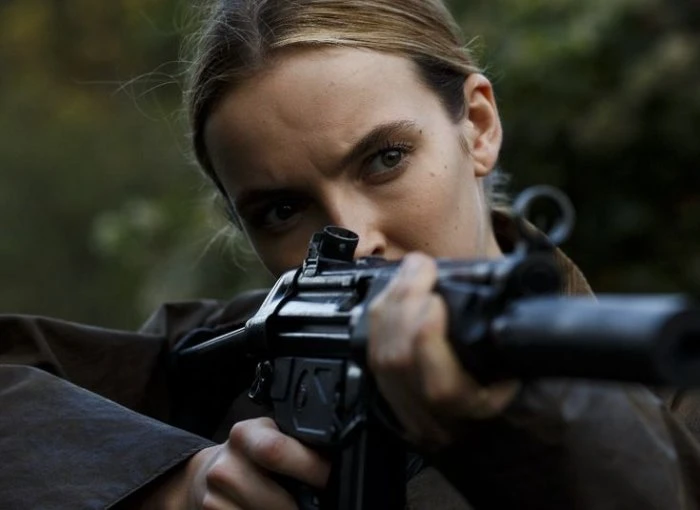
The hunted in this case is a very dangerous prey, a ruthless assassin called Villanelle played by Jodie Comer. She is a psychopath in the most literal sense of the word, but this does not mean she is indifferent to humanity. She observes it as an outsider. She is fascinated by it. She tries very hard to imitate it. Sometimes it seems she even wants to be part of it - just like a real girl. She does not like being told that she is a psychopath. She wants to believe that she can change.
Her psychopathy is an asset in her profession as a hired killer, but this strength is also a weakness. She is difficult to control. She is impulsive and easily bored. She wants to be amused all the time. Comer in interviews has compared her with a cat, and the analogy is a good one. Villanelle is charming, playful, entertaining, and wholly unpredictable. She can be incredibly vicious when provoked - which is not difficult - or in cold blood, and seems to feel no hint of remorse afterwards.

Yet she is not shallow. As the seasons progress, we find out how she became what she is, and it prompts interesting questions of "Nature Versus Nurture." We see how her Villanelle persona is just one of many she adopts. She is still in many ways a girl from the backwoods of Russia trying to move on from a broken childhood. She chooses the name Villanelle because it sounds glamorous (apparently a perfume favoured by Louis XV's mistress, the Countess du Barry), not because of any association with the word "villain." She dresses in garish clothes that seem almost a pastiche of fashion (ironically, they became oddly fashionable as the result of the show's popularity, which tells you all you need to know about fashion).
Her flamboyance extends to her work. Again, what makes her good at her job makes her bad at it because her daring and sometimes ostentatious assassinations attract attention. An MI5 analyst called Eve Polastri, the Eve of the title, concludes that they are the work of the same individual and becomes increasingly obsessed.
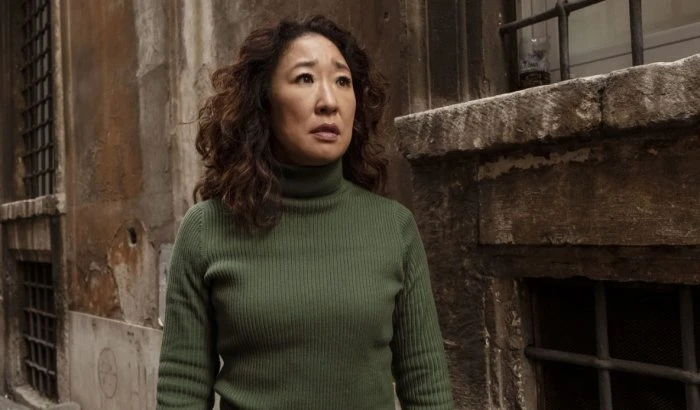
Eve (Sandra Oh) is in many ways the mirror opposite of Villanelle. She is happily married with a comfortable middle class lifestyle - very comfortable for two people in London on public sector salaries it must be said. She is insightful, organised, and practical - her practicality reflected in her utilitarian clothes, quite unlike Villanelle's outlandish wardrobe. Is her interest in the idea of Villanelle a subconscious hint of her dissatisfaction with what many would consider the perfect respectable lifestyle? The thing about mirror opposites is that they are basically the same.
Eve's obsession leads her to being fired by MI5 but also to her being picked up by well connected MI6 agent Carolyn Martens (Fiona Shaw) who is running an "off the books" operation. As Eve's investigation gets closer to her, Villanelle becomes aware of it. Eve discovers that horrible truth that when you stare long enough at the void, it stares back at you.
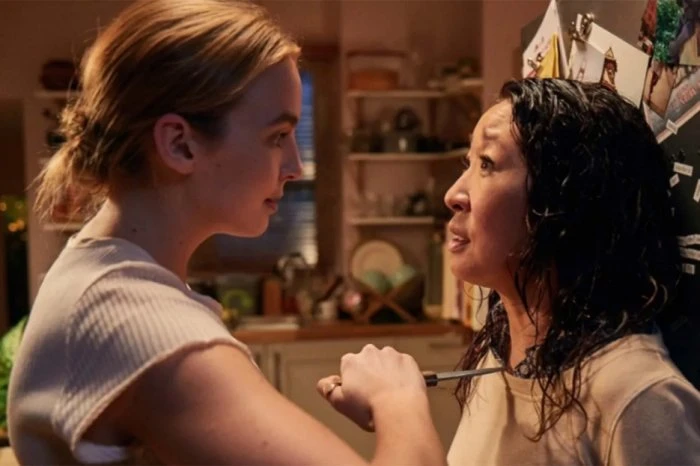
The main storyline of the four seasons is the development of the relationship, in the broadest sense of the word, between Villanelle and Eve - an extremely abusive relationship involving mutual attempted murder, torture of loved ones, and betrayal. To call it a love story is to demonstrate little understanding of love, but there is no doubt that the pair have a mutual attraction, again in the broadest sense of the word, or at least a mutually destructive compulsion. Each fills an emotional need the other did not know she had. There are times when it seems Villanelle wants to be Eve and Eve, Villanelle. The difference is that, over the course of the four seasons, Eve does indeed become a lot more like Villanelle, a process which Villanelle encourages, but Villanelle's occasional attempts to become more like Eve seem doomed to fail.
All this is made more credible than it should be by two great actresses at the top of their game. Although "cult" favourite Oh has both the title role and top billing, Killing Eve is really "The Villanelle Show" and Comer has by far the most memorable part.
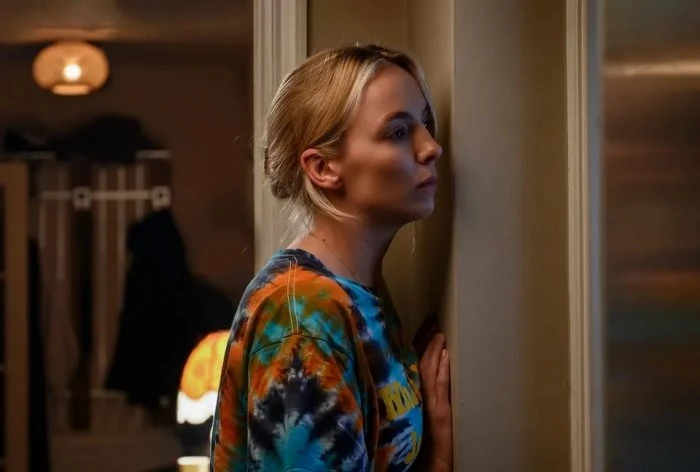
She was not the obvious choice for it. She had demonstrated that she could handle a leading role in The White Princess, but that had not demanded of her anything like the range required to play Villanelle. There was strong competition for the part, and no wonder, because it is obviously a career maker in the right hands. It demands the ability to play a number of different characters: in addition to Villanelle herself, there is the Villanelle persona she creates for herself - in effect a completely different character - and a number of other disguises she adopts on her missions. It therefore requires a very talented actress to play a very talented actress playing a number of other parts.
Comer delivers, and in doing so reveals a level of versatility one might not have expected from her earlier work. One might even compare her with the young Alec Guinness. She has a particular gift for accents, so much that it comes as a shock when she is interviewed in person in her native Liverpudlian. One assumes at first she is just putting on another one to show off.
She is also brilliant in her balancing the unwavering stare of a person who does not appreciate basic social convention with the twitchiness of an easily distracted child. One sees what she means about the feline influence.
Oh's part demands greater subtlety. She is supposed to be the more sensible one of the two, so it is entertaining to see her solid façade crumble under Villanelle's influence. Oh has a particular gift for getting increasingly "frazzled" under pressure.
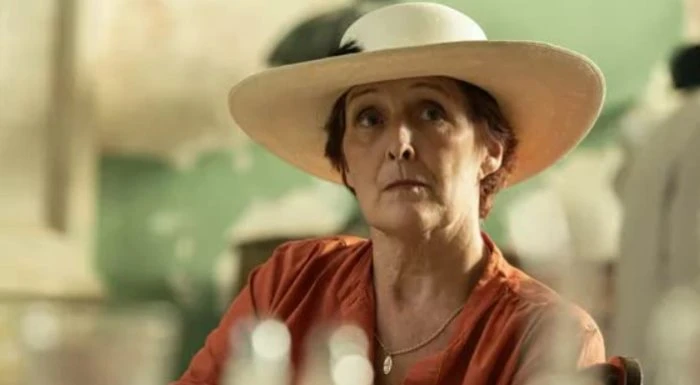
Shaw provides a carefully observed study of a highly accomplished and self-confident career woman with little in the way of inner knowledge. Her work is her life and she is good at it, not caring much for family, romantic love, or any other aspect of her existence - which are nevertheless aspects of her existence, just neglected and chaotic. As a result, she has nothing on which to fall back and she loses all sense of perspective when her professional life collides with her personal life.
As it happens, Shaw played another woman with a long career in MI6 around the same time, in the excellent Mrs Wilson, and it is impressive how little the two characters have in common. That is acting. Carolyn Martens exudes upper middle class entitlement and never really stops to question her place in the world. She seems totally in control even when she is not.
We get a clever glimpse of how she developed in a "flashback" episode, and full marks to Imogen Daines doing a first class Fiona Shaw impersonation as a wholly credible young Carolyn. There is talk of a Carolyn "spin off." If so, one hopes Daines will be part of it.
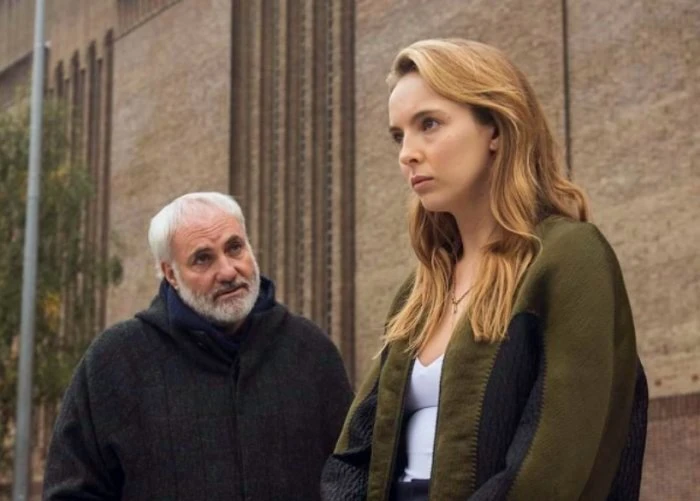
Kim Bodnia, the ursine Danish actor who was so good in The Bridge, does well to hold his own among these talented actresses. He is Villanelle's "handler," and he seems almost sympathetic at times when he really appears to care for her like a substitute daughter - it so happens that he does not get on well with his real daughter. However, like all the relationships in Killing Eve, even this apparently genuine friendship is tainted by the fact that neither can trust the other: he is exploiting her, and she knows it; and he is afraid of her, and she knows it.
The other males in the cast are rather overshadowed by the women. Adrian Scarborough is an exception, cast very effectively against type as a far less sympathetic "handler." David Haig is so likeable as a colleague of Eve's that the viewer knows not to get too fond of him. Steve Oram is a pastor with a past.
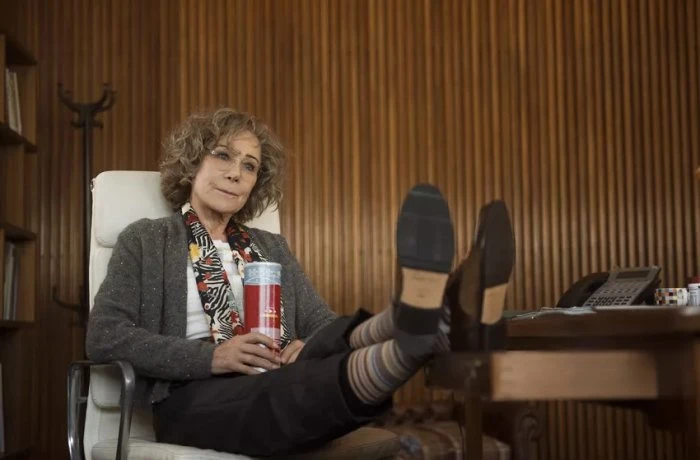
It is no surprise that women dominate the supporting and guest roles as well as the principals. Zoe Wanamaker may be the only woman who could convince as Martens' superior, which she does. Similarly, only Harriet Walter could be sufficiently daunting as Villanelle's mentor. Susan Lynch is poignant as a woman for whom Villanelle has an obsession before Eve - to whom her story should be a giant flashing red light. Gemma Whelan from Game of Thrones is Carolyn's daughter. Camille Cottin from Call My Agent is a high-ranking member of the sinister organisation that employs Villanelle - her physical description is simply "French."
The location work, all over Europe, including Paris, Berlin, Amsterdam, and, of course, Margate is superb, evoking the old style glamour of traditional spy movies. A pivotal scene in Hadrian's Villa in Tivoli is especially memorable - if one can overlook the implication that a secret tunnel leads there directly from the centre of Rome, about twenty miles away.
So the cast, the concept, and the production values were all in place for a true classic, and the first season promised just that. What went wrong?

The final season was botched from start to finish, but, being honest, the Law of Diminishing Returns set in long before then. The central relationship between Eve and Villanelle, the spine that gave strength to the whole story, began to crumble very quickly. It demanded that both characters overlook too much. Surely Eve's fascination with Villanelle could not have survived the brutal murder of a friend or the torture of a loved one? If it did, how can she remain a character worthy of the viewer's sympathy? As for Villanelle, she seems depressingly, and perhaps unrealistically, incapable of change, and, if that is the case, why does she not deal with Eve as she does with all the other potential threats in her life? One feels in the end that neither of these women are being true to who they really are.
Worse, for a feminist drama, the show seems to have an incredibly low view of women.
There is perhaps a danger in writing a review in the immediate aftermath of having watched a disappointing final season of a show of which one once had high hopes. Call it "The Game of Thrones Effect." One may easily forget, or at least undervalue, what one once loved. Nothing alters the fact that the first season of Killing Eve was a great piece of television and the second had some great moments. If it had retained a single "showrunner" throughout, with a single vision of the characterisation, and of the beginning, middle, and end of a single story, it might be remembered as a truly revolutionary moment in television drama. As it is, it is still very entertaining in places and a fine showcase for the talents of three outstanding actresses.
Seen this show? How do you rate it?
Seen this show? How do you rate it?
Published on April 27th, 2022. Written by John Winterson Richards for Television Heaven.


